The question of whether the Pope is a Christian is one that has been asked by many people, both within and outside the Catholic Church. At the heart of this question is the issue of what it means to be a Christian, and whether the Pope, as the leader of the Catholic Church, fulfills this definition.
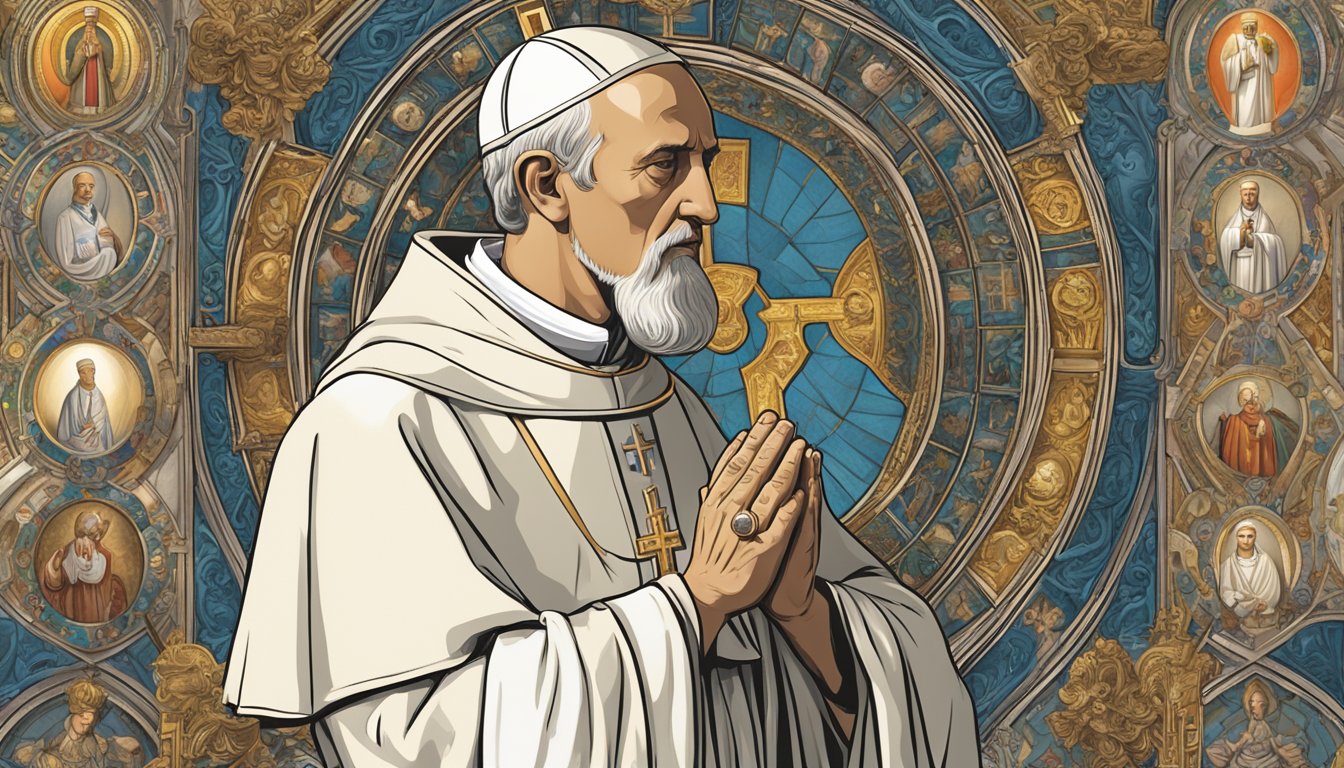

To answer this question, it is important to understand the historical context of the papacy, as well as the role and authority of the Pope within the Catholic Church. This includes examining the Pope’s role as a spiritual leader, as well as the teachings of the Catholic Church and its views on what it means to be a Christian.
Overall, the question of whether the Pope is a Christian is a complex one that requires a nuanced understanding of the role of the Pope within the Catholic Church, as well as the teachings of the Church itself. While there is no easy answer to this question, exploring the historical and spiritual context of the papacy can shed light on this important issue.
Key Takeaways
- Understanding the historical context of the papacy is important in answering the question of whether the Pope is a Christian.
- The role and authority of the Pope within the Catholic Church is central to this question.
- The teachings of the Catholic Church and its views on what it means to be a Christian are also relevant to this issue.
Historical Context of the Papacy

https://www.youtube.com/watch?v=KDOKd1z3NmM&embed=true
Origins of the Papacy
The papacy, or the office of the bishop of Rome, has a long and complex history that dates back to the early days of Christianity. According to tradition, the apostle Peter was the first bishop of Rome, and his successors have continued to hold that position to this day. However, the historical record is somewhat murky, and there is some debate among scholars about the exact nature of the early papacy.
One theory is that the papacy emerged gradually over time, as the bishop of Rome gradually became more prominent within the Christian community. Another theory is that the papacy was established more abruptly, perhaps in response to the growing influence of the Roman Empire.
Regardless of the exact origins of the papacy, it is clear that the office of the bishop of Rome has played an important role in the history of Christianity. Over the centuries, the pope has been seen as a spiritual leader, a political leader, and a symbol of unity for the worldwide Catholic Church.
Notable Popes Throughout History
Throughout its long history, the papacy has been held by many notable figures, some of whom have had a profound impact on the course of history. Here are just a few examples:
- Peter: According to tradition, Peter was the first bishop of Rome and the founder of the papacy.
- Linus, Anacletus, and Clement I: These were among the earliest popes, and little is known about their lives or their papacies.
- Constantine: The first Christian emperor of Rome, Constantine played a key role in the development of the early Christian Church, and his reign marked a turning point in the history of the papacy.
- Gregory I: Also known as Gregory the Great, this pope helped to establish the medieval papacy and played a key role in the spread of Christianity throughout Europe.
- Innocent III: One of the most powerful popes in history, Innocent III played a key role in the political and religious affairs of Europe in the early 13th century.
- Francis: The current pope, Francis is known for his progressive views on social issues and his efforts to reform the Catholic Church.
Role and Authority of the Pope
https://www.youtube.com/watch?v=JDX6Zwnfv3I&embed=true
The Pope is the Bishop of Rome and the head of the Roman Catholic Church. He is considered the Vicar of Christ and the successor of Saint Peter, who was the first Bishop of Rome. The Pope has a unique role and authority within the Catholic Church, which is based on the doctrine of papal primacy.
Papal Primacy
Papal primacy is the doctrine that the Pope has supreme authority over the entire Catholic Church. This means that he has the power to make decisions on matters of faith and morals, to appoint bishops and cardinals, and to speak infallibly on matters of doctrine. The Pope’s authority is based on his role as the successor of Saint Peter, who was given the keys to the kingdom of heaven by Jesus Christ himself.
Papal Infallibility
Papal infallibility is the doctrine that the Pope is preserved from error when he speaks ex cathedra, or from the chair of Saint Peter. This means that when the Pope speaks on matters of faith and morals in his official capacity as the head of the Catholic Church, he is protected from error by the Holy Spirit. This doctrine was defined by the First Vatican Council in 1870.
The Pope exercises his authority through the Roman Curia, which is the administrative body of the Catholic Church. The Roman Curia is divided into several departments, each of which has a specific role in the governance of the Church. The Pope also has the power to convene ecumenical councils, which are gatherings of bishops from around the world to discuss matters of doctrine and practice.

In summary, the Pope’s role and authority within the Catholic Church are based on the doctrines of papal primacy and papal infallibility. He has the power to make decisions on matters of faith and morals, to appoint bishops and cardinals, and to speak infallibly on matters of doctrine. The Pope exercises his authority through the Roman Curia and has the power to convene ecumenical councils.
Pope as a Spiritual Leader
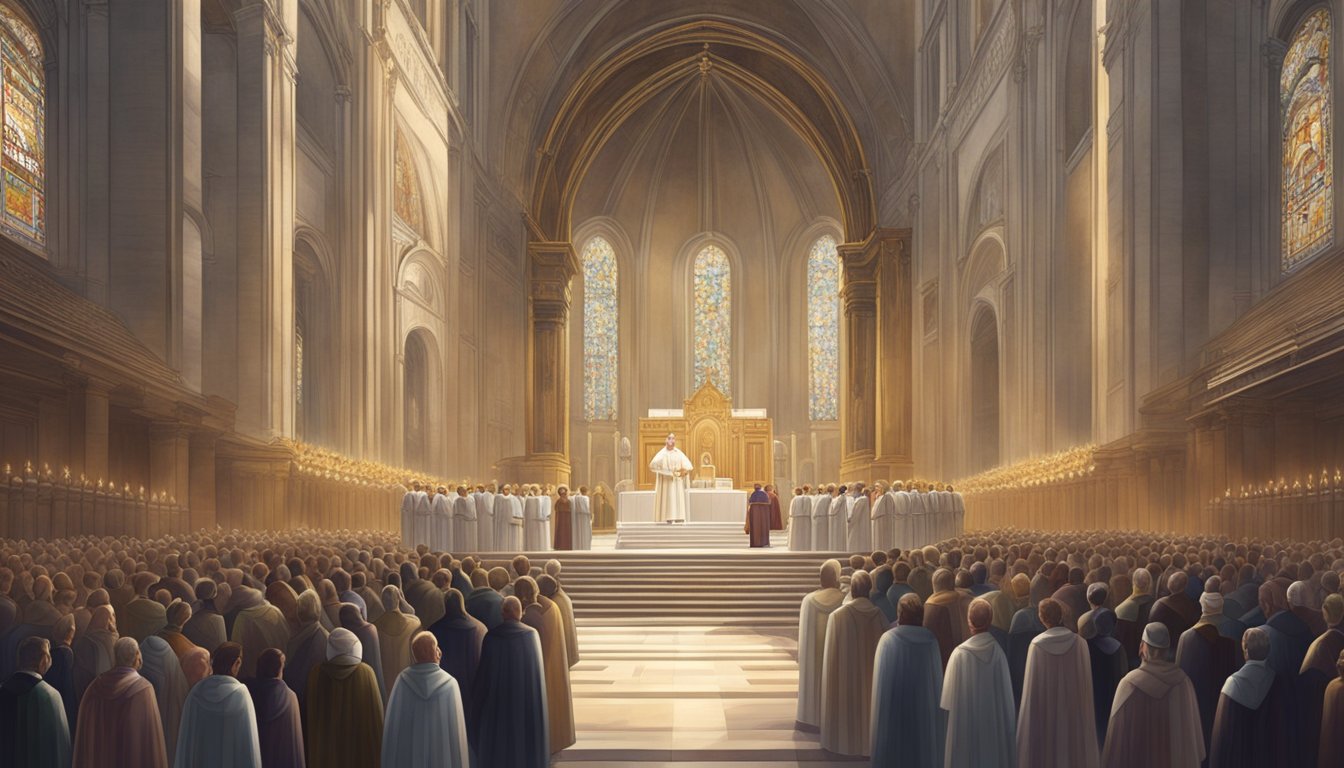
The Pope is not only the head of the Catholic Church but also a spiritual leader who guides and inspires millions of followers around the world. He is considered the Vicar of Christ, representing Jesus on earth and serving as a shepherd to his flock.
Guidance in Faith
As a spiritual leader, the Pope provides guidance in faith to Catholics worldwide. He is responsible for interpreting the Gospel and ensuring that the teachings of the Church are in line with the teachings of Jesus Christ. The Pope also serves as a moral compass for Catholics, helping them to navigate the complexities of life and make decisions that are in line with their faith.
Pastoral Responsibilities
In addition to his role as a spiritual leader, the Pope is also responsible for the pastoral care of his followers. He serves as a pastor to the Catholic Church, providing guidance and support to Catholics around the world. The Pope is also the servant of the servants of God, meaning that he is responsible for serving the needs of his followers and ensuring that their spiritual and physical needs are met.
Overall, the Pope is a Christian leader who serves as a representative of Jesus Christ on earth. He is responsible for guiding his followers in faith and providing pastoral care to those in need. Through his teachings and actions, the Pope inspires Catholics worldwide to live a life that is in line with the teachings of Jesus Christ and to strive for a place in heaven.
The Catholic Church and Its Teachings
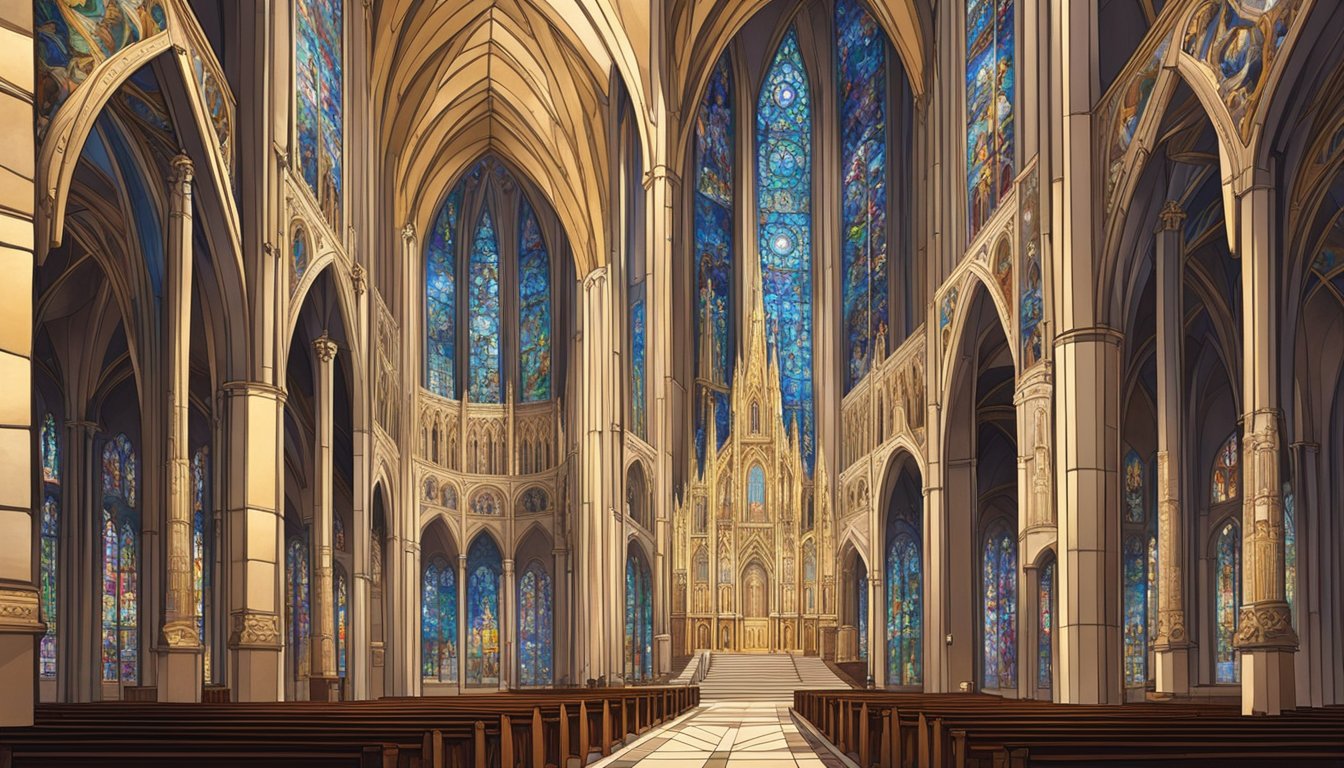
The Catholic Church is the largest Christian denomination in the world, with over 1 billion followers. The Church’s teachings are based on the Bible, tradition, and the magisterium, which is the Church’s teaching authority.
Doctrine and Morality
The Catholic Church teaches that there is one God who created the universe and everything in it. The Church believes in the Holy Trinity, which is the belief in one God in three persons: the Father, the Son, and the Holy Spirit. The Church also teaches that Jesus Christ is the Son of God and that he died on the cross to save humanity from sin.
The Church’s teachings on morality are based on the Ten Commandments and the teachings of Jesus Christ. The Church teaches that all human life is sacred and that every person has a duty to protect and respect life from conception to natural death. The Church also teaches that marriage is a sacred union between one man and one woman and that sexual activity should only take place within the context of marriage.
Catholic Churches and Their Unity

The Catholic Church is a universal Church, which means that it is made up of many different churches from around the world. These churches are all in communion with the Pope, who is the Bishop of Rome and the head of the Catholic Church. The Church teaches that the Pope is the successor of Saint Peter, who was appointed by Jesus Christ to be the leader of the Church.
The Catechism of the Catholic Church is the official teaching document of the Church. It contains a summary of the Church’s teachings on doctrine, morality, and spirituality. The Catechism is organized into four parts: the Creed, the Sacraments, the Commandments, and Prayer.
The Catholic Church teaches that it is the one true Church founded by Jesus Christ, and that it is the only Church that has the fullness of truth. The Church also teaches that it is possible for people outside of the Church to be saved, but that the Catholic Church is the surest path to salvation.
In conclusion, the Catholic Church’s teachings are based on the Bible, tradition, and the magisterium. The Church’s teachings on doctrine and morality are centered on the belief in one God and the teachings of Jesus Christ. The Church is made up of many different churches from around the world, all in communion with the Pope. The Catechism of the Catholic Church is the official teaching document of the Church, and it contains a summary of the Church’s teachings on doctrine, morality, and spirituality.
The Pope’s Role in Ecumenical Relations
https://www.youtube.com/watch?v=gLjHKbyc_r4&embed=true

The Pope, as the leader of the Catholic Church, plays a significant role in ecumenical relations with other Christian denominations and engagement with non-Christian faiths. The Catholic Church has been involved in ecumenism, which is the movement towards unity among Christian denominations, since the Second Vatican Council in the 1960s.
Dialogue with Other Christian Denominations
The Pope has engaged in dialogue with other Christian denominations, such as Protestants and Eastern Orthodox churches, in an effort to promote unity among Christians. Pope Francis has emphasized the importance of dialogue and has met with leaders from various Christian denominations to discuss shared beliefs and differences.
The Catholic Church has also participated in joint statements and declarations with other Christian denominations, such as the Joint Declaration on the Doctrine of Justification with the Lutheran World Federation in 1999.
Engagement with Non-Christian Faiths
The Pope has also engaged in dialogue and engagement with non-Christian faiths, such as Islam and Judaism. Pope Francis has met with leaders from these faiths to promote peace and understanding between different religions.
The Catholic Church has also issued statements and documents on interfaith relations, such as Nostra Aetate, a declaration on the relation of the Church with non-Christian religions, which was issued by the Second Vatican Council in 1965.

In summary, the Pope plays a crucial role in promoting ecumenical relations with other Christian denominations and engagement with non-Christian faiths. Through dialogue and engagement, the Catholic Church seeks to promote unity, peace, and understanding among different religions.
Papal Influence Beyond Religion
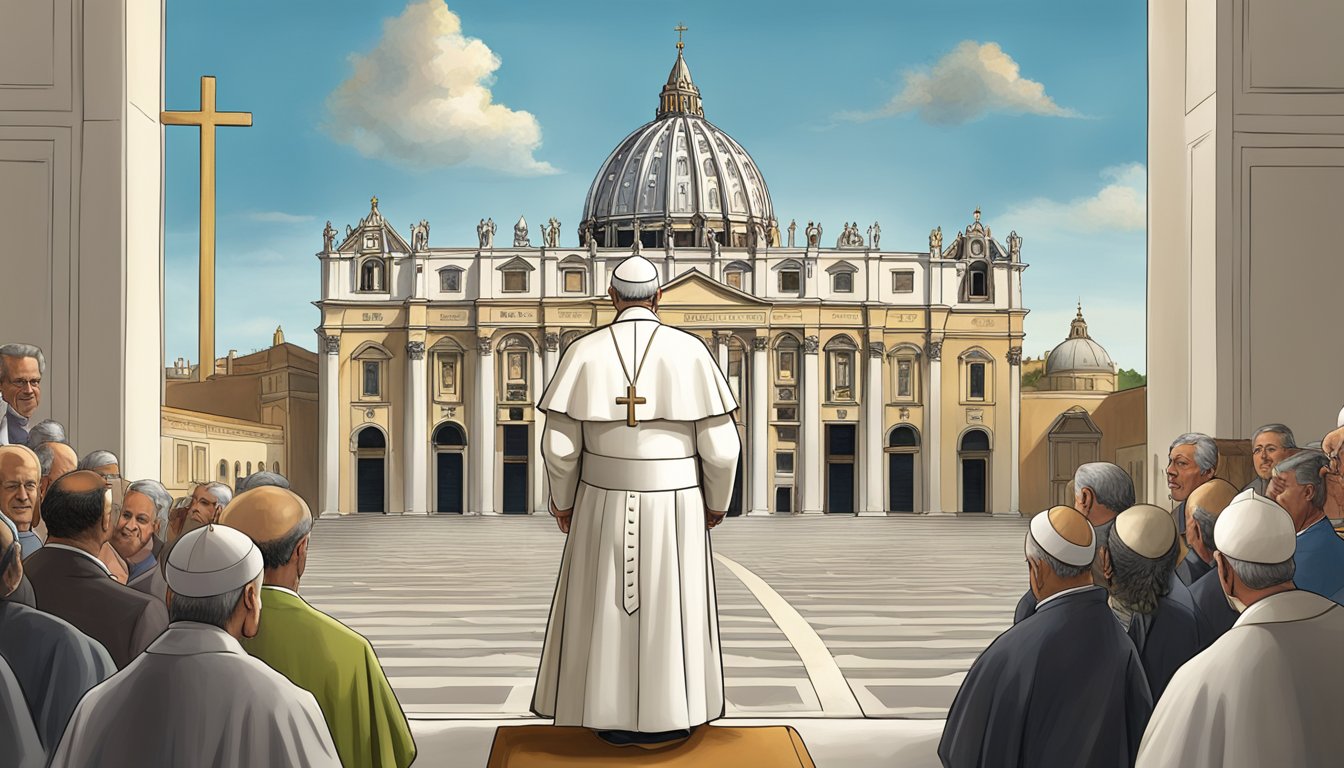
The Pope is not only the spiritual leader of the Catholic Church but also holds significant influence beyond the realm of religion. The cultural, educational, political, and diplomatic roles of the Pope have a significant impact on the world.
Cultural Impact
The Pope has a significant cultural impact, particularly in the arts. The Vatican has an extensive collection of art, including works by Michelangelo and Raphael. The Pope has also been known to commission works of art, such as the Sistine Chapel ceiling. The Vatican also hosts numerous cultural events, including concerts and exhibitions.
The Pope’s influence extends beyond the Vatican’s walls. Catholicism has influenced art, literature, and music throughout history. The Pope’s messages and teachings have inspired countless artists, writers, and musicians. The Pope’s influence on culture can be seen in everything from Renaissance art to contemporary music.
Political and Diplomatic Roles

The Pope also holds significant political and diplomatic roles. The Vatican City State, which is an independent city-state, is a member of the United Nations and maintains diplomatic relations with over 180 countries. The Pope also has the power to appoint bishops, who play a significant role in local politics.
The Pope’s diplomatic efforts have been instrumental in resolving conflicts and promoting peace. The Pope has played a role in the peace process in the Middle East and has been a vocal advocate for nuclear disarmament. The Pope has also been involved in efforts to address climate change and poverty.
In conclusion, the Pope’s influence extends far beyond the religious realm. The cultural impact and political and diplomatic roles of the Pope have a significant impact on the world. The Pope’s teachings and messages continue to inspire people of all backgrounds, and his diplomatic efforts have helped to promote peace and resolve conflicts.
Selection and Succession of Popes
https://www.youtube.com/watch?v=rFAtTWtsOnM&embed=true
Conclave and Election
The selection and election of the pope is a complex process that has evolved over the centuries. Today, the pope is elected by the College of Cardinals, which is made up of the most senior members of the Catholic Church. The election takes place in a closed-door meeting called the conclave, which is held in the Sistine Chapel in Vatican City.

During the conclave, the cardinals vote on a new pope. To be elected, a candidate must receive a two-thirds majority of the votes. If no candidate receives the required number of votes, the cardinals continue to vote until a new pope is elected.
Historical Successions
The Catholic Church believes that the pope is the successor of Saint Peter, who was appointed by Jesus Christ as the leader of the Church. The pope is considered the spiritual leader of the Catholic Church and is responsible for guiding the Church and its followers.
The succession of popes can be traced back to Saint Peter, who is considered the first pope. Since then, there have been 266 popes, each of whom has played an important role in shaping the Catholic Church.
The Annuario Pontificio is a publication that lists all of the popes and their successors. It is published every year by the Roman Curia and is considered the official record of the papacy.
Overall, the selection and succession of popes is a complex process that has evolved over the centuries. The Catholic Church believes that the pope is the spiritual leader of the Church and is responsible for guiding the Church and its followers.
Symbols and Titles of the Papacy

https://www.youtube.com/watch?v=dsfA_DDHlaU&embed=true
The papacy is the office held by the Pope as the bishop of Rome and head of the worldwide Catholic Church. The papacy is associated with several symbols and titles, which are used to represent the Pope’s authority and position.
Keys of the Kingdom
One of the most recognizable symbols of the papacy is the Keys of the Kingdom. This symbol represents the power given to Saint Peter by Jesus Christ, as described in the Gospel of Matthew. The Keys of the Kingdom are depicted as two crossed keys, one gold and one silver, and are often seen on the coat of arms of the Holy See. The gold key represents the power to bind and loose in heaven, while the silver key represents the power to bind and loose on earth.
The Title ‘Servant of the Servants of God’
Another important title associated with the papacy is “Servant of the Servants of God.” This title is used to emphasize the Pope’s role as a servant of the people and a representative of Christ on earth. The title was first used by Pope Gregory I in the 6th century and has been used by many Popes since then.
Papal Symbols
In addition to the Keys of the Kingdom and the title “Servant of the Servants of God,” the papacy is associated with several other symbols. These symbols include the papal tiara, a three-tiered crown worn by Popes until the 1960s, and the papal cross, a cross with three bars that represents the Pope’s authority as Bishop of Rome, Vicar of Christ, and Pastor of the Universal Church.

Overall, the symbols and titles associated with the papacy serve to emphasize the Pope’s authority and position as the head of the Catholic Church. While some of these symbols may seem outdated or antiquated, they continue to play an important role in the Church’s traditions and rituals.
The Vatican and its Significance
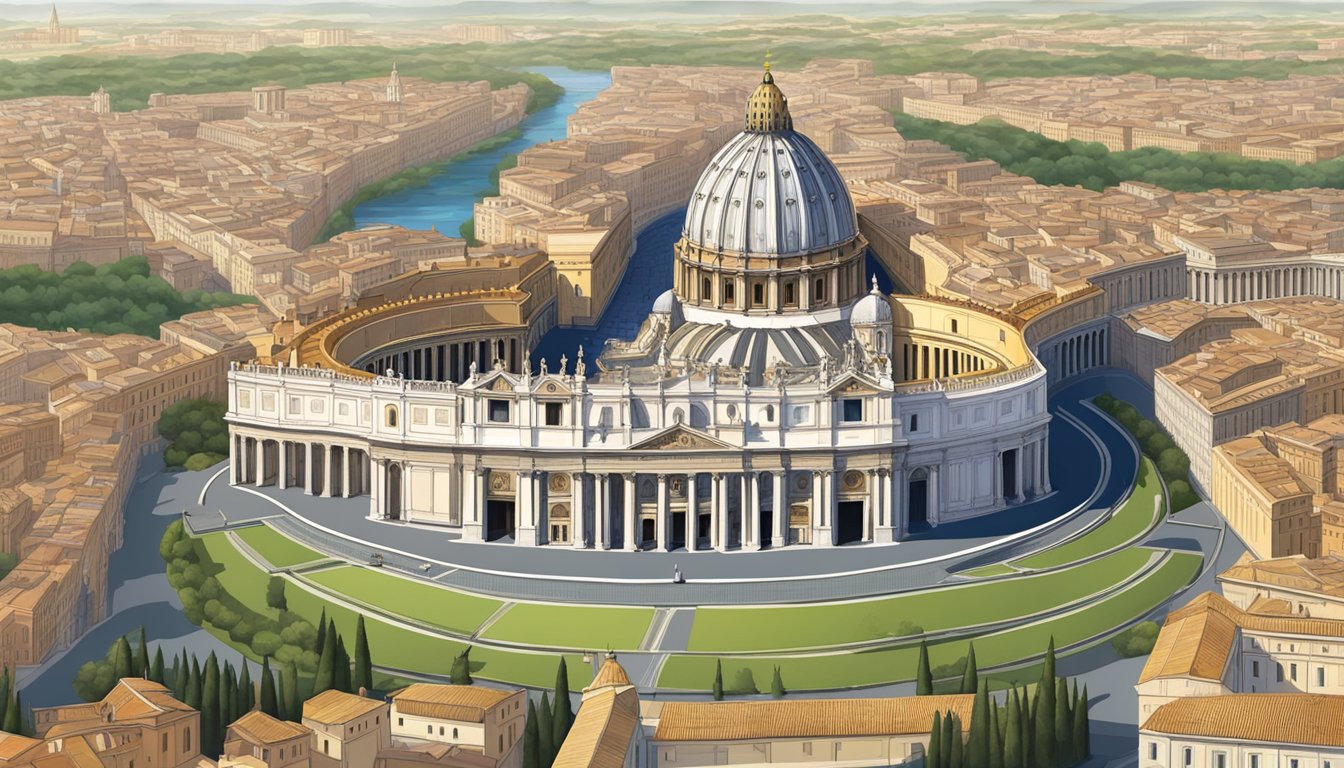
The Vatican is the smallest independent state in the world, covering an area of approximately 44 hectares. It is the headquarters of the Roman Catholic Church and the residence of the Pope. The Vatican City is located within the city of Rome, Italy, and is surrounded by high walls.
Vatican City as a Sovereign State
The Vatican City is a sovereign state, which means that it has its own government, laws, and currency. The Pope is the head of state and is elected by the College of Cardinals. The Vatican City has its own police force, the Swiss Guard, and its own radio station, Vatican Radio.
The Holy See and its Administration
The Holy See is the central governing body of the Roman Catholic Church. It is responsible for the administration of the Church and its various departments, including the Congregation for the Doctrine of the Faith and the Congregation for the Evangelization of Peoples. The Holy See is also responsible for diplomatic relations with other countries and international organizations.

The administration of the Holy See is headed by the Secretary of State, who is responsible for the day-to-day management of the Church’s affairs. The Secretary of State is appointed by the Pope and is assisted by various departments, including the Secretariat for the Economy and the Secretariat for Communications.
The Vatican is also home to the largest church in the world, St. Peter’s Basilica. The Basilica is located within the Vatican City and is the burial site of many popes, including St. Peter, the first pope.
In conclusion, the Vatican is a significant entity in the Roman Catholic Church. It is the headquarters of the Church and the residence of the Pope. The Vatican City is a sovereign state with its own government, laws, and currency. The Holy See is responsible for the administration of the Church and its various departments. St. Peter’s Basilica is the largest church in the world and is located within the Vatican City.
Contemporary Issues and the Papacy
https://www.youtube.com/watch?v=PwQYefFrki0&embed=true
Modern Challenges
The papacy has faced numerous challenges in the modern era, including internal issues such as corruption and external issues such as declining membership and relevance. Pope Francis has made efforts to address some of these challenges, including tackling corruption within the Vatican and promoting social justice causes.
However, some critics argue that the papacy is out of touch with modern issues and that it needs to adapt to remain relevant. For example, the Catholic Church’s stance on social issues such as contraception and same-sex marriage has come under scrutiny in recent years. Pope Francis has taken a more liberal stance on some of these issues, but there is still a divide between the Church’s teachings and the views of many modern Catholics.
The Pope’s Role in a Changing World
The role of the Pope in a changing world is also a topic of debate. Some argue that the Pope should be a moral leader and promote world peace, while others believe that the Pope should focus on internal Church issues.
Pope Francis has made efforts to promote world peace, including participating in interfaith dialogues and advocating for nuclear disarmament. However, some critics argue that the Pope’s role should be limited to religious matters and that he should not involve himself in political issues.
Overall, the papacy faces numerous challenges in the modern era, and the role of the Pope is constantly evolving. While some believe that the papacy needs to adapt to remain relevant, others argue that the Pope’s role should be limited to religious matters. Pope Francis has made efforts to address some of these challenges, but there is still much debate about the role of the papacy in a changing world.
Frequently Asked Questions
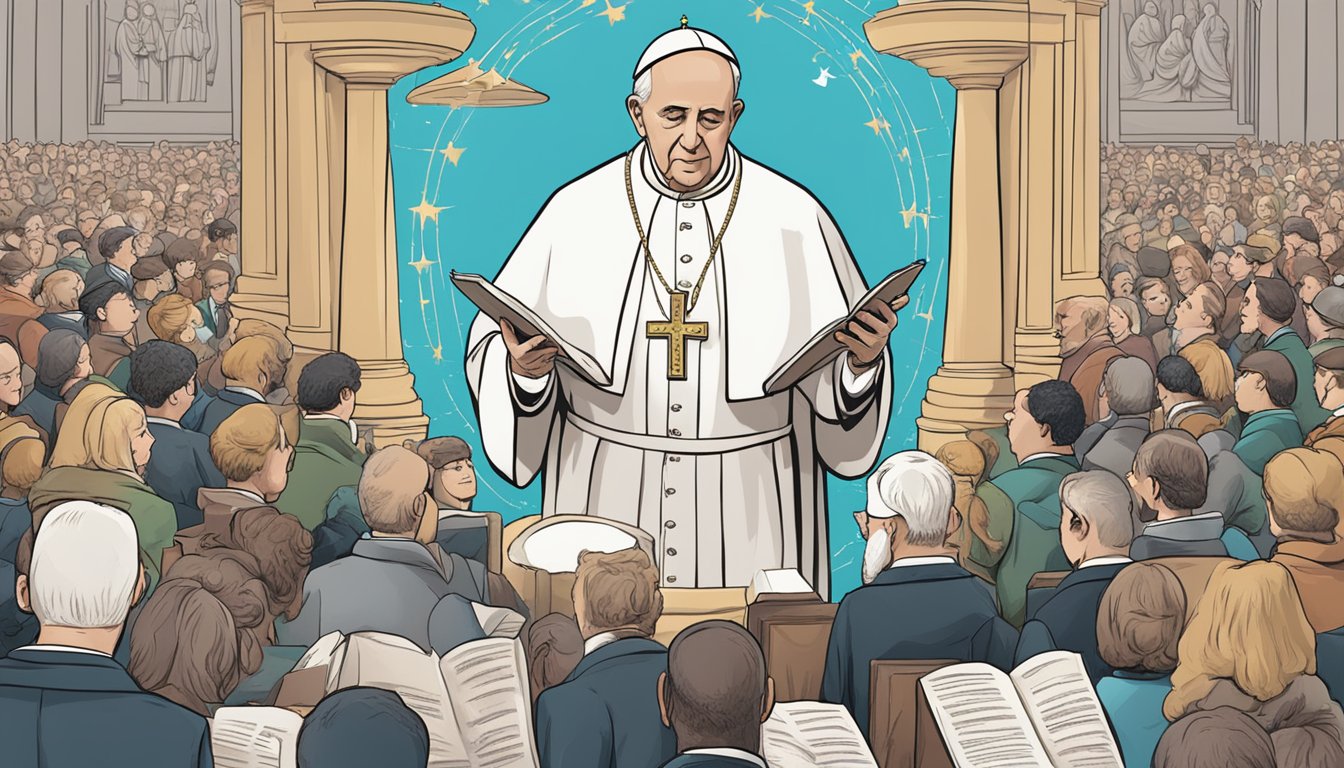
Who is Pope Francis and why is he significant to the Christian faith?
Pope Francis is the current head of the Roman Catholic Church and the Bishop of Rome. He was elected in 2013 after the resignation of Pope Benedict XVI. He is significant to the Christian faith because he is seen as the spiritual leader of over 1.2 billion Catholics around the world. He is also a prominent figure in the global community, using his position to advocate for social justice and environmental issues.
What is the historical role of the Pope within Christianity?
The role of the Pope within Christianity has evolved over time. The Pope is considered the spiritual leader of the Roman Catholic Church and is seen as the successor of Saint Peter, who was one of the apostles of Jesus Christ. The Pope has traditionally been seen as having authority over all Christians, and has played a role in shaping Christian doctrine and theology. However, this authority has been contested by other Christian denominations, who do not recognize the Pope’s leadership.
Can you explain the difference between Catholics and Christians?
Catholics are a subset of Christians, and the main difference between Catholics and other Christians is their belief in the authority of the Pope. Catholics believe that the Pope is the spiritual leader of all Christians, and that he has the authority to interpret scripture and shape Christian doctrine. Other Christians, such as Protestants, do not recognize the Pope’s authority and believe that each individual has the right to interpret scripture for themselves.
What religion does the Pope lead?
The Pope is the leader of the Roman Catholic Church, which is one of the largest and oldest Christian denominations in the world. The Catholic Church has its roots in the early Christian Church, and has played a significant role in shaping Christian theology and doctrine over the centuries.
How does one become a Pope, and who was the second person to hold this position?
To become Pope, one must be elected by the College of Cardinals, which is a group of high-ranking officials within the Catholic Church. The election process is known as a conclave, and it takes place after the death or resignation of the previous Pope. The second person to hold the position of Pope was Saint Linus, who succeeded Saint Peter as Bishop of Rome in the first century.
What is the relationship between the Vatican and the Christian faith?
The Vatican is the headquarters of the Roman Catholic Church, and is located within the city of Rome. It is the residence of the Pope and the administrative center of the Catholic Church. The Vatican plays a significant role in the Christian faith, as it is the center of Catholicism and the seat of the Pope’s authority.












